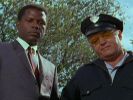Eye For Film >> Movies >> In The Heat Of The Night (1967) Film Review
In The Heat Of The Night
Reviewed by: Jennie Kermode

When critics of the film industry claim that films have no meaningful impact on the world, In The Heat Of The Night is one of the best examples you can use in counter-argument. For all that Jack Johnson and Muhammad Ali had done with their fists, a fictional slap proved equally important in changing the mindset of millions of Americans. In a year that began with the beating of John Weerd Smith and the Newark riots, just eight months before the assassination of Martin Luther King, it opened to audiences shocked by its audacity. Impressively, it retains the power to shock today, though for different reasons. It is also, quite apart from all that, a remarkably good film.
Intelligence is one of the few things that one just can't play if one doesn't have it, regardless of level of skill. Sidney Poitier - who apparently haggled over the plot before accepting the role - puts across a fierce intelligence as Mr Virgil Tibbs, a homicide detective whose sojourn in a redneck Mississippi town might otherwise have us questioning his mental acuity. The first of the civil rights acts may have passed, but this is still not a place where a black man can feel safe, especially if he wears a business suit and refuses to suffer fools. Tibbs doesn't initially intend to be there, of course. He's just passing through, waiting to change trains when he's arrested because a white man has been murdered. Discovering his occupation is a little embarrassing for the local police, who are already unhappy about his manner, but they need his expertise and so an agreement is reached.

On one level this is a classic buddy cop movie - Tibbs works with resentful police chief Gillespie (Rod Steiger, who won an Oscar for his efforts) and the two gradually learn to respect each other - but the tone is very different. This is noir, and nobody's moral stance is uncomplicated, with even Tibbs called upon to examine his assumptions about others. The characters are richer for it. Audience members - crucially, at the time of release, even white ones - are naturally draw to side with Tibbs, but his imperfections make it possible to care about him as well. This adds to the tension in scenes where he is physically threatened. Although Poitier is six foot two, we are always alert to his vulnerability - even though modern viewers might not fully understand how hostile parts of the rural South could be to black men at that time, and how little the law could be relied upon for protection.
Cinematography by the legendary Haskell Wexler points up the film's many layers of ambiguity. Light levels are lower than in other films of the period to avoid glare limiting Poitier's powers of expression, and this adds something to the film as a whole, changing familiar hues in a way that makes the viewer uncertain, combining with the racist threat to keep us watching the shadows. It contributes to a moodiness that suggests the small town's real problems cannot be solved as easily as the murder (which itself throws up numerous complications). There's a sense that even that act of violence is superficial - that there's something wrong in Sparta, Mississippi which threatens everyone, not just the outsider.
Built into all this is the murder mystery itself, which is intellectually satisfying and adds to the development of sub-themes around social class and the treatment of women. Then there's that slap - Tibbs reacting to a white man who has slapped him in the face. It doesn't impact in the same way today but it's still a powerful moment, with Larry Gates' confounded expression helping to communicate the shocking nature of the act. Today, it's the local diner's refusal to serve Tibbs that creates a similar sense of dislocation.
The historic and historical value of this film is immeasurable; it's also a superior thriller which stands up well even when shorn of context. It would go on to spawn two sequels, but this is the one to watch.
Reviewed on: 26 Oct 2016

















